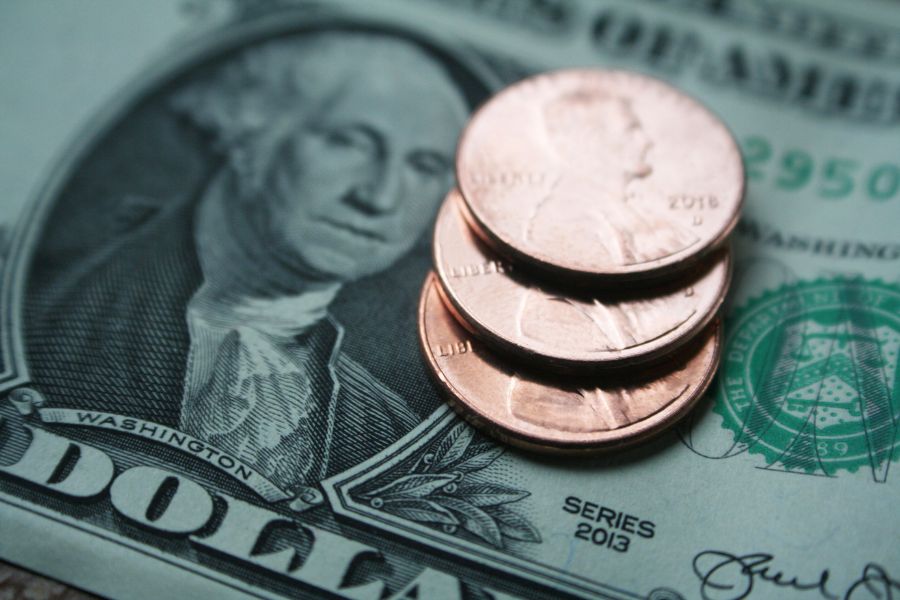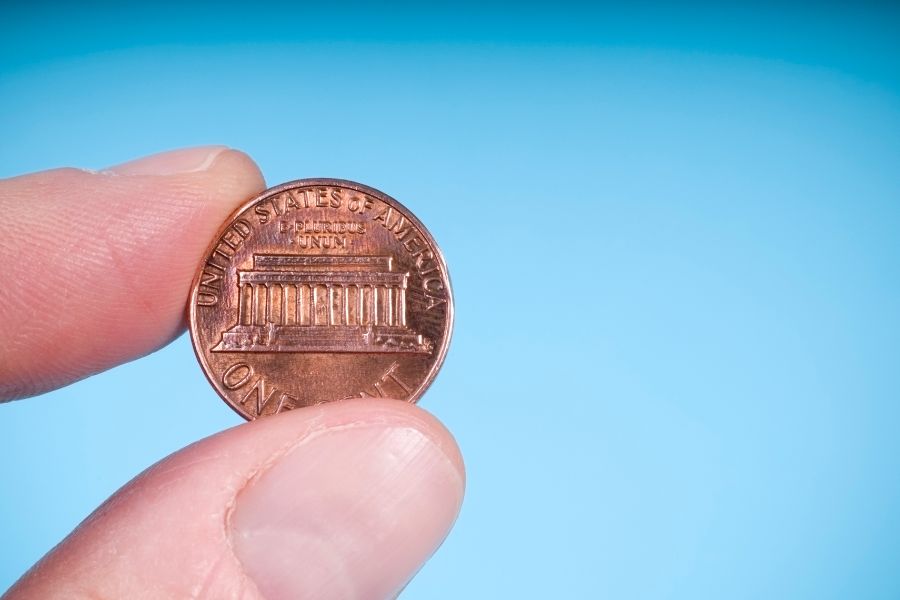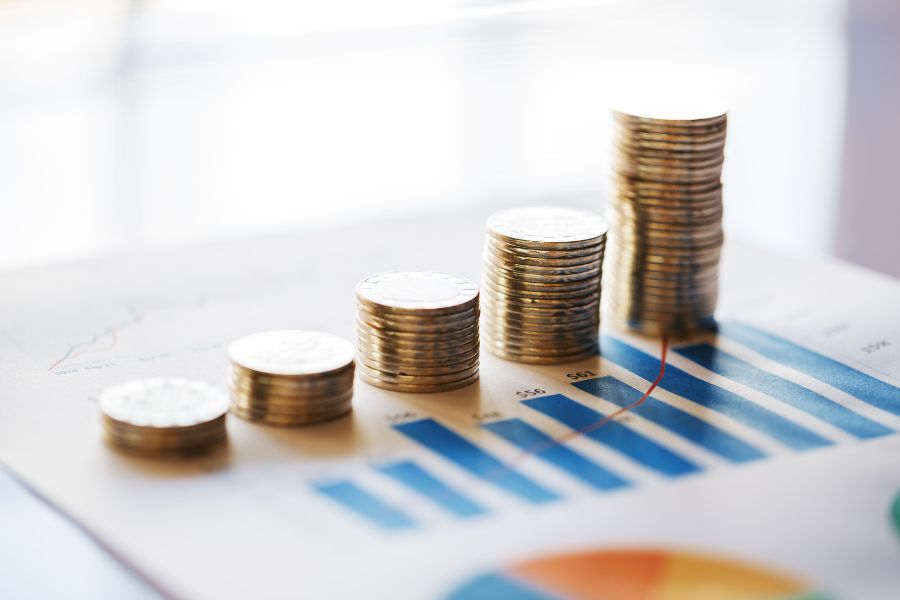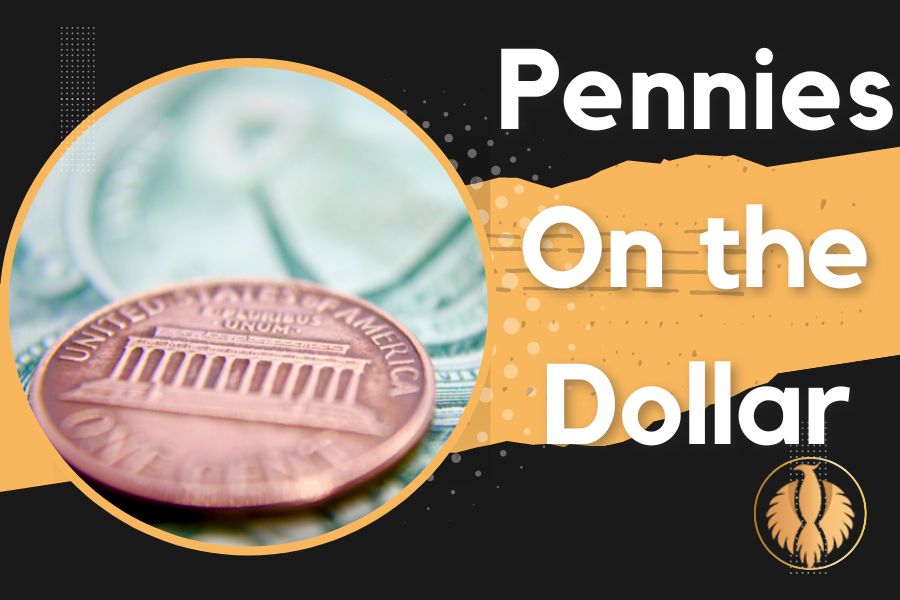I’m here today with a new lesson for you. Have you ever heard the expression “pennies on the dollar”? This phrase is quite useful in everyday conversations, especially when discussing deals, discounts, or financial matters. Understanding idiomatic expressions like this one can significantly enhance your English proficiency, making your speech more natural and engaging.
So, follow me through this lesson right to the end, and you’ll gain a deeper understanding of its meaning and usage.
What does “pennies on the dollar” mean? the expression “pennies on the dollar” is often used to describe a situation where something is bought or sold at a very low price compared to its actual value. Imagine you find a designer jacket worth $200, but you manage to buy it for just $20. In this case, you bought the jacket for pennies on the dollar.
This idiom vividly illustrates the concept of getting a significant bargain or discount.
Understanding idioms like “pennies on the dollar” is crucial for several reasons. Firstly, idioms are a fundamental part of any language.
They add color and depth to conversations, making them more interesting and relatable. By learning and using idioms, you can express complex ideas succinctly and effectively.
This not only improves your communication skills but also helps you connect better with native speakers.
Secondly, idioms often reflect cultural nuances and historical contexts. By exploring idiomatic expressions, you gain insights into the culture and values of the people who use the language.
This cultural awareness can enhance your overall language learning experience, making it more enriching and enjoyable.
Moreover, idioms like “pennies on the dollar” are frequently used in various forms of media, including books, movies, and news articles.
Recognizing and understanding these expressions can improve your comprehension skills, allowing you to enjoy and appreciate English content more fully. It also prepares you for real-life conversations, where idioms are commonly used.
Pennies on the dollar: A deep look
Now, let’s delve deeper into the meaning and usage of “pennies on the dollar.” The phrase essentially means acquiring something at a fraction of its original cost. It’s often used in financial contexts, such as when discussing investments, sales, or auctions.
For instance, if a company’s stock plummets and you buy shares at a significantly reduced price, you could say you bought the stock for pennies on the dollar.
The idiom can also be applied in everyday situations. For example, during a clearance sale, you might find items being sold for pennies on the dollar. This indicates that the items are being offered at a steep discount, providing great value for the buyer.
In terms of grammar, “pennies on the dollar” is a fixed expression. It doesn’t change form and is used as a whole phrase. You can use it in various sentence structures, such as:
- “I bought this antique vase for pennies on the dollar.”
- “During the auction, many items were sold for pennies on the dollar.”
By incorporating this idiom into your vocabulary, you can add a touch of flair to your language.
It’s a handy expression that can be used in both formal and informal contexts, making your speech more dynamic and engaging.
In conclusion, learning idiomatic expressions like “pennies on the dollar” is immensely beneficial for English learners.
It enhances your communication skills, enriches your cultural understanding, and improves your comprehension of various media.
So, let’s dive into this lesson and explore the fascinating world of idioms together!
Don’t miss our new video about Pennies On the Dollar – watch now!
Pennies on the dollar: Meaning + Grammar + 5 Ways to use it
For those who are not familiar with the currency of the United States of America, I should mention here that a penny is 1 cent.
There are 100 cents in a US dollar. Therefore, a penny is one percent of a dollar.
“Pennies on the dollar”
Meaning :
(idiomatic) A small amount of money, much less than would be expected
In other words, if something is pennies on the dollar, it’s much cheaper than it costs originally.
The Origin of The Expression “Pennies on The Dollar”

To understand this expression better, you need to know about the origin of “pennies on the dollar”. Its origin goes back to exchange rates.
In financial exchanges between different currencies, the worth of each country’s money can differ significantly from another one.
This means if you give someone ten US dollars, you won’t necessarily get ten Canadian dollars or ten English pounds.
To describe the difference in the value of different currencies, we use the preposition “on.” For instance, if someone offers you ten pounds on the dollar, it means they offer to give you ten pounds for every dollar that you give them.
You Might Also Enjoy: Complete list of Hunting Phrases and Idioms
5 Ways to Use the Expression “Pennies on The Dollar”
The expression “pennies on the dollar” can be used in five different ways. I have outlined these five different ways here for you:
- to say that something is much cheaper than it should be
- to compare the cost or value of two different things
- to talk about bank investment
- to talk about the return on an investment
- to describe something of little worth
In the following, I will explain each of these conditions for you in detail. I will also give you examples of how they are used in sentences.
“Pennies on the dollar” as a synonym for cheap
The first and most common meaning of this expression is cheap; if you buy something for “pennies on the dollar” it means you buy it cheaper than it originally was.
In this case, the higher price is represented by “dollar” and the lower price by “pennies.” The real difference in value might not be a specific number of pennies, but the expression suggests that the new price is much lower.
This isn’t always a good thing, though. If you bought the item at a lower price and are now selling it at a higher price, you are at an advantage.
However, if you bought the item at a higher price and are now selling it for cheaper, you might be at a disadvantage. Look at the following examples to learn the usage of this expression better.
Examples:
- “I bought a bunch of bitcoins right before the market crashed, so I had to sell them for pennies on the dollar.” (He sold them cheaper than the original price)
- “The man who owned the shop said he was selling me the baseball cards at such a loss he would only earn pennies on the dollar.” (He is selling the item so cheap)
- There was a big clearance sale at the furniture shop and she bought a new sofa for pennies on the dollar. (She bought it at a very cheap price)
- After he had an accident, he decided to get rid of his motorcycle and sold it for pennies on the dollar. (He sold it very cheaply, for much less than what it was worth)
In the above examples, you can see that this expression means a small amount of money and a lot less than the original price.
As you see, it can be used to describe both a bad deal (selling for a small amount) and a good deal (buying for a small amount).
You Might Also Enjoy: Business vs Busyness – All You Need to Know + Examples
“Pennies on the dollar” to compare two values

The second way to use this expression is when we want to compare two values of things with each other.
In this usage, the expression does not talk about a change in the cost of a specific item; but it is used to compare two distinct conditions, like the difference between two people’s salaries, the cost of land in two different cities, or any other pair of things.
For instance, when you say that “Teachers in Iran work for pennies on the dollar” You are saying that they work very cheaply, in comparison to another country or the international standard.
Likewise, when you say that “Clothing in India costs pennies on the dollar”, it means that clothing in this country costs a lot less than in your country.
In both cases, you are saying something is extremely cheap in comparison with what you are familiar with or what should be.
However, both items that are compared don’t have to be mentioned in the sentence. In fact, one of them is often implied. Look at the following examples to understand this better.
Examples:
- “Before child labor laws were passed, large companies used to hire minors for pennies on the dollar.” (Children were paid much less than adults)
- “Houses in Thailand are so cheap you can get them for pennies on the dollar.” (The houses are a lot cheaper in Thailand than they are where the speaker is currently living)
“Pennies on the dollar” in bank investment
The third way to use “pennies on the dollar” is when talking about bank investments.
The phrase “pennies on the dollar” has its origins in the world of finance and business and it can also be used to describe the return on investments.
This meaning of the expression is less known and less common, but it is still used for the purpose of comparison. In bank investment, you earn money on the money you have invested.
When someone tells you that you will earn “pennies on the dollar”, they mean that for every dollar you put into a savings account, you will earn a few pennies.
This usage of the expression usually has a time period too. The time period is how long it takes for your investment to earn you the extra money.
For instance, if you earn ten pennies on the dollar after a month and you put in ten dollars, you will gain one hundred pennies, or ten dollars, at the end of that month. Look at the following examples to learn this better.
Examples:
- “My grandpa got rich earning pennies on the dollar. Every time he got paid, he just reinvested the extra money.” (The speaker’s grandfather in this sentence may not have earned much for every dollar, but he understood that pennies add up if you get a lot of them.)
- I invested 100 dollars in the bank and I earned 12 pennies on the dollar each year.
“Pennies on the dollar” in other investments

The fourth way to use this expression is in the field of various types of investment. If you invest money in something and make a small return on it, you can say that you earned pennies on the dollar.
For instance, if you buy an old house that is run down, and then fix it up and sell it for much more, you earn or make pennies on the dollar.
As another example, imagine that you buy stocks or cryptocurrencies at a low price and later they become much more valuable.
After selling these stocks or currencies, you have earned pennies on the dollar. Look at the following examples.
Examples:
- “It wasn’t a very good investment, because it only earned two pennies on the dollar after a whole year.”
- Buying a house in the country was a good investment for me; it earned me 100 pennies on the dollar after two years.
“Pennies on the dollar” to describe something of little worth
The fifth way to use “Pennies on the dollar” is to describe something that has little value.
We use it when something’s value has fallen extremely and it is now only worth a small percentage of what it was worth previously. Look at the following examples.
Examples:
- When the financial crisis hit, the company went bankrupt and its shares were only worth pennies on the dollar.
- when the import of stock cars to Iran was allowed by the government, all the cars that were made in the factories inside the country were worth pennies on the dollar since they were of very low quality compared to the imported cars.
You Might Also Enjoy: Cream Rises to the Top [Definition + Examples]
The difference between “pennies on the dollar” and “pennies to the dollar”
Although “pennies on the dollar” is the standard way to use this phrase, you may also see or hear “pennies to the dollar.”
There is also a third version that you may face in some contexts, which is “pennies for every dollar”.
In spite of the slight differences in phrasing, all these three versions have the same meaning. In the following, I have provided you with an example sentence for each of these versions.
Examples:
- “The movie star was depressed because actresses only earned pennies for every dollar compared to their male costars.”
- “The movie star was depressed because actresses only earned pennies on the dollar compared to their male costars.”
- “The movie star was depressed because actresses only earned pennies to the dollar compared to their male costars.”
As you see, all these sentences convey the same meaning: the female movie star is upset because she realizes that she earns a lot less money than her male counterparts.
You Might Also Enjoy: As Busy as a One-Armed Paper Hanger + Examples
Concluding note
Well, today I tried to tell you everything you need to know about the expression “pennies on the dollar”.
I told you its meaning and usage. As I said, there are 5 ways to use it in context. I reviewed each of these 5 ways in detail and gave you example sentences so you can understand their usage better.
To summarize, “pennies on the dollar” is usually used to describe a situation where something has been bought at a significant discount. It can also be used to describe something that is much cheaper in comparison.
It can be used to describe profit made in investment, and finally to say that something is basically worthless and has been sold for a small amount of its potential value. At the end, I told you about the different phrasings of the expression and their meanings.
Now that you have learned this expression’s meaning and usage fully, go on to make your own example sentences.
You can write your examples here and ask me to correct you if needed. I’ll be happy to help. Hope you enjoyed this lesson. Visit my page again for more interesting English lessons.

Hi, welcome to my blog! My name is Omid and I am thrilled to have you here! I am an English language teacher with 12 years of experience and hold multiple international certifications (TESOL, IELTS, TOEFL, PTE, CELTA). Additionally, I hold a PhD in Applied Linguistics with a specialization in Teaching English as a Second Language (TESL), which fuels my passion for teaching English and assisting others in mastering the language. To me, nothing is more rewarding than helping individuals enhance their English language abilities through various methods. So, let’s embark on this journey of learning English together.




